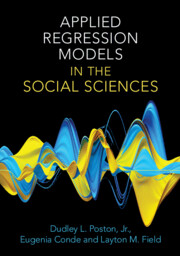Book contents
- Applied Regression Models in the Social Sciences
- Applied Regression Models in the Social Sciences
- Copyright page
- Brief Contents
- Contents
- Figures
- Tables
- Preface
- 1 Introduction
- 2 Undertaking Statistical Analysis Using Stata
- 3 Undertaking Statistical Analysis Using R
- 4 Descriptive Statistics and the Normal Distribution
- 5 Statistical Tables and Cross-Tabulations
- 6 Bivariate Regression and Correlation and Statistical Inference
- 7 Multiple Regression and Correlation
- 8 Regression Assumptions and Diagnostics and Robust Regression
- 9 Missing Data
- 10 Issues of Survey Design
- 11 Binomial Logistic Regression
- 12 Ordinal Logistic Regression
- 13 Multinomial Logistic Regression
- 14 Count Regression
- 15 Survival Analysis
- 16 Multilevel Models
- 17 Other Issues and Final Thoughts
- References
- Index
8 - Regression Assumptions and Diagnostics and Robust Regression
Published online by Cambridge University Press: 17 August 2023
- Applied Regression Models in the Social Sciences
- Applied Regression Models in the Social Sciences
- Copyright page
- Brief Contents
- Contents
- Figures
- Tables
- Preface
- 1 Introduction
- 2 Undertaking Statistical Analysis Using Stata
- 3 Undertaking Statistical Analysis Using R
- 4 Descriptive Statistics and the Normal Distribution
- 5 Statistical Tables and Cross-Tabulations
- 6 Bivariate Regression and Correlation and Statistical Inference
- 7 Multiple Regression and Correlation
- 8 Regression Assumptions and Diagnostics and Robust Regression
- 9 Missing Data
- 10 Issues of Survey Design
- 11 Binomial Logistic Regression
- 12 Ordinal Logistic Regression
- 13 Multinomial Logistic Regression
- 14 Count Regression
- 15 Survival Analysis
- 16 Multilevel Models
- 17 Other Issues and Final Thoughts
- References
- Index
Summary
When we use ordinary least squares (OLS) regression with data sampled from a larger population, there are several assumptions that need to be met for the results to be reliably extended to the larger population. In the first part of this chapter, we discuss each of these assumptions. We note some of the problems that will occur if one or more of them are violated. In the second part of the chapter, we turn to issues of regression diagnostics, that is, methods and approaches for determining whether the assumptions are met in the sample data. In the third and last section of the chapter, we discuss the topic of robust regression. We note that, under ideal conditions, OLS regression is preferred over other regression methods. But sometimes when some of the OLS regression assumptions are not met, the OLS regression breaks down and should not be used for the analysis. In such situations, regression methods less demanding than OLS may be introduced. Robust regression is one such method. It sometimes performs in a more satisfactory manner than OLS when some of the OLS assumptions are not met and when there are other statistical problems in the analysis.
Keywords
Information
- Type
- Chapter
- Information
- Applied Regression Models in the Social Sciences , pp. 177 - 236Publisher: Cambridge University PressPrint publication year: 2023
